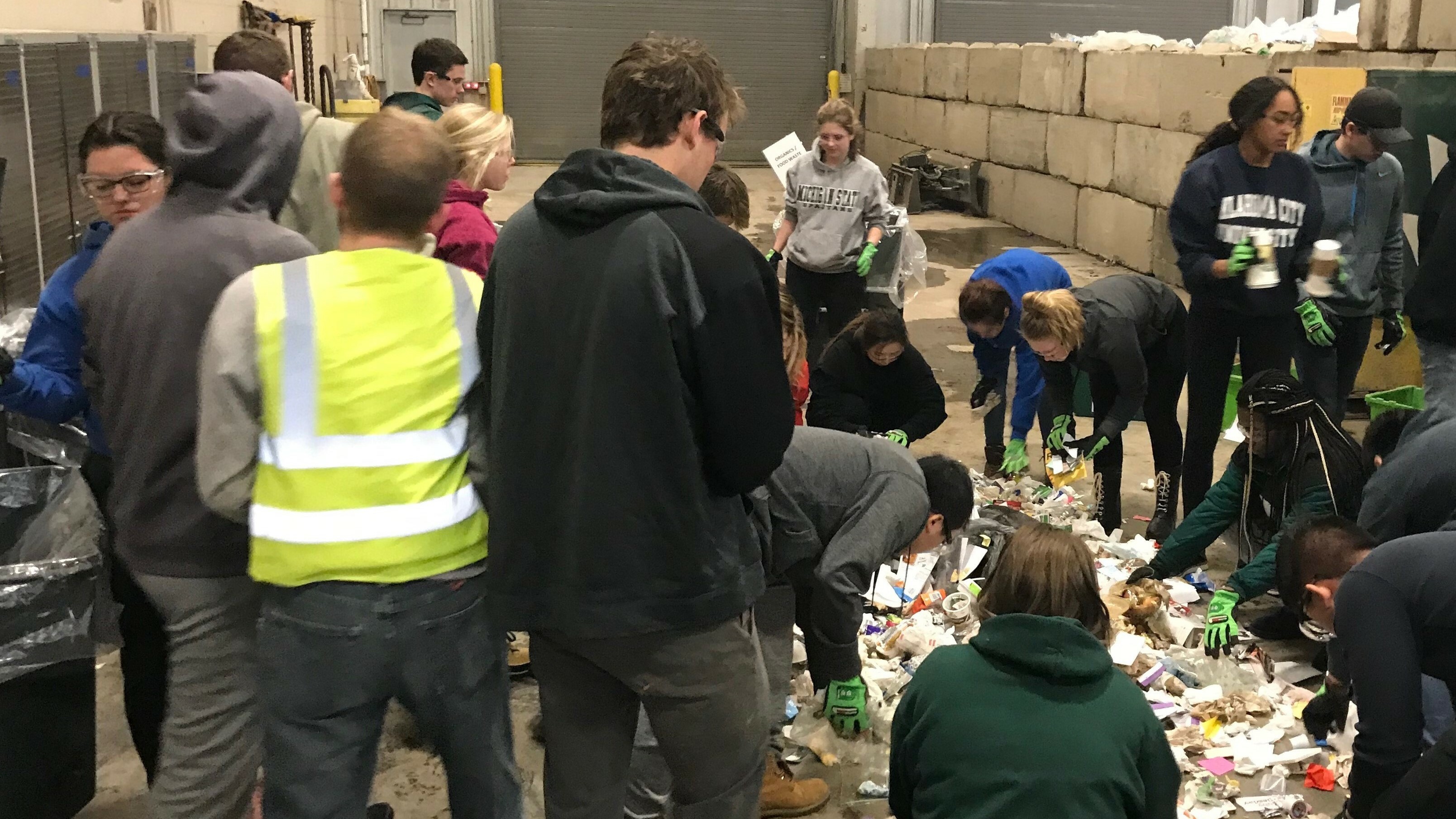Sorting Trash Reveals Missed Opportunity
Posted by Katie Deska on Mar 30th 2020
In simpler times, before the pandemic put things on hold, the Surplus Store & Recycling Center regularly hosted waste sorts, a hands-on activity for campus classes and groups. In February, over twenty students from a community sustainability class came to participate in one.
What is a waste sort?
When doing a waste sort, we first don our personal protective equipment, then we dive in, sorting through a pile of trash collected earlier that day from a campus building. Our purpose is to determine what’s in the trash that could’ve been recycled, reused or composted. Ultimately, we see just how little of the pile is material best suited to the landfill. After the sort, we collect the weights of each commodity and record the data. Doing the sorts helps us learn trouble spots on campus, determine our educational pitfalls, and plan an intervention for improvement.
What did we find?
In this sort, we worked our way through 100 pounds of trash collected from Bessey Hall. Of the total waste sorted, only 15% was determined to be best suited to the landfill. The remaining 85% was determined by students to be divertable material.
Specifically, 59% was recycling, 22% was organic material that could be composted, and 4% was reusable goods that could’ve been sent to the Surplus Store. In that last category, we found a Spartan branded koozie and mouse pad, an unopened fan attachment for a cell phone, a scrubbing pad, and some new pencils. (As a reminder, any MSU student, faculty, staff, alumni or retiree can donate unwanted, good condition items to the Surplus Store for resale through the Community Reuse Program. Simply bring donation items to the store during open hours, or if you’re on campus, send them in a small box via campus mail.)
In addition to the surplus goods and compostable material, we found various types of recyclables, including cardboard, paper, plastic, glass, metal, and polystyrene (Styrofoam). We were surprised to find that nearly 20% of the trash we picked through was paper items that could have been easily recycled—and could have earned us revenue.
Profit from paper
When we do a waste sort and find a large amount of paper in the trash, we know we’re missing an opportunity to do the right thing – our mission is to manage MSU’s waste as a resource.
When paper is landfilled, instead of recycled, we waste economic and natural resources, that could be better used elsewhere. Every time we dump a load of trash at the landfill we have to pay Granger a tipping fee. On the other hand, when we recycle that same material, we save on the landfill expense and generate revenue from the sale of paper for recycling.
Case study
Let’s take a look at trash from Bessey Hall, where we pulled the trash from to sort. Between August 2019 and March 2020, SSRC collected nearly 31,000 lbs. of discarded material, including 16,400 lbs. of trash, recycling, organics and surplus goods, from the building. Of that, 47% was diverted away from the landfill. However, we can speculate that, as with the waste sort, a good chunk of the material that was put in the trash dumpster was possible to divert.
Say we apply the same potential diversion rate discovered during the waste sort (85%) to the 16,400 lbs. of trash landfilled from that eight-month period (Aug-Mar). That would mean that nearly 14,000 lbs. of trash. could have been kept out of the landfill – more than the weight of an African elephant! If we figure that 20% of that trash is paper, we essentially threw away a value of $144, when accounting for saved landfill fees and earned recycling revenue.
Maximizing impact
To maximize our profit, we do our best to keep office paper separate from mixed paper. Generally, office paper is copy paper of any color, whereas mixed paper is the material that makes up paper packaging, junk mail, magazines, etc. Both types earn us a profit, but sorted office paper earns us over 15 times more (!!) per ton than if included with our mixed paper bales.
So let’s do our best to recycle our paper rather than trash it. For those of you with an office on campus, check out our free under-the-desk boxes that help you streamline your paper recycling. For at home, consider placing a recycling bin next to every trashcan in your house – this will help you remember to do the right thing and recycle.

